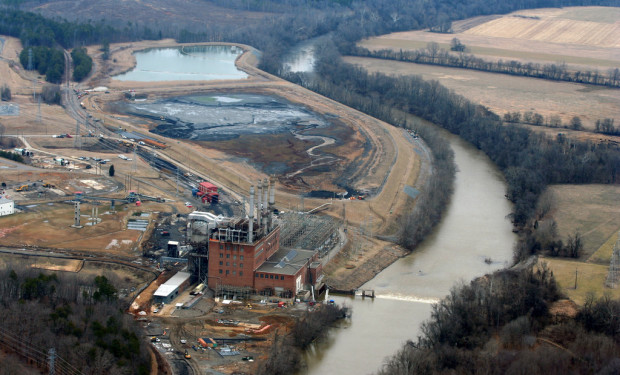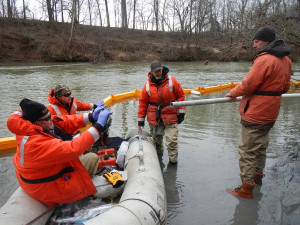Duke Energy’s coal ash spill calls North Carolina politics into question
Duke Energy’s Coal Ash Spill that contaminated the Dan River raises questions about the balance between state regulation and the pro-business agenda of North Carolina leaders.
The story seems to be drafted by the writers of Netflix’s House of Cards – with a few tweaks of course. Instead of the hustle and bustle of Washington D.C., the smaller scale Raleigh and Charlotte, North Carolina, take center stage. Add in a Governor with twenty-eight years of loyalty to a former company, campaign contributions that raise eyebrows, and lax regulations that led to an environmental disaster, and you get the excitement surrounding Duke Energy’s coal ash spill into the Dan River. Hopefully for the citizens of North Carolina, however, the response by our leaders in the weeks and months ahead will be swift and honest in nature.
The spill sparked outrage from many environmental groups, leading to questions as to how Duke Energy could have prevented it from happening.
Duke Energy is the largest electricity provider in the United States with over seven million customers, mostly in the South and Midwest, and tens of billions of dollars in revenue. Duke Energy operates many types of plants to serve its customers, including nuclear, coal, and hydro-related operations. According to Duke Energy’s website, the company operates fifteen coal plants in total. In North Carolina, Duke Energy has closed down half of its fourteen coal plants over the years.
One of the main issues with coal-powered plants is the remaining “coal ash” that is deposited after the coal is burned. The coal ash byproduct can be stored wet or dry on-site, with wet storage collecting into “ponds” often containing several thousand tons of material. Maintenance of the coal ash is critical because the coal ash is composed of arsenic and lead, among other dangerous substances.
On February 2, 2014, a pipe roughly four feet in diameter burst at Duke Energy’s retired coal plant near Eden, North Carolina, sending tens of thousands of tons of coal ash into the Dan River. The spill sparked outrage from a multitude of environmental groups, leading to questions as to how Duke Energy could have prevented it from happening.
The coal ash pond in question was evaluated in 2009 and found to be in good condition, although some seepage was present. The report was done by an independent third party, who further noted that if the coal ash pond (which was held in place by a dam) was breached, there could be extreme environmental consequences.
The 2009 evaluation, signaling how devastating a breach in a coal ash pond could be, did not appear to have much effect on North Carolina Department of Environment and Natural Resources (NCDENR). A partisan difference in environmental policy has been seen in the state’s agencies since Republicans took control of North Carolina’s legislature in 2010 and the Governor’s office two years later. Agencies, such as NCDENR, which were originally the regulators that implemented state and federal policies, were ordered by North Carolina lawmakers to treat the business entities they worked with as “customers,” rather than regulated bodies.
Subsequently, NCDENR seemed to reverse its ideology from being an enforcer of environmental laws to a customer service provider working for the companies it once regulated.
This change in philosophy occurred soon after Governor Pat McCrory took office. McCrory worked for Duke Energy for twenty-eight years prior to his service as mayor of Charlotte, the position he held before being elected Governor of North Carolina. Duke Energy also contributed over one million dollars to McCrory’s campaign funds as well as an additional one million dollars to other North Carolina state legislator campaigns. There have been no accusations of impropriety; however, the sizeable political contributions at least lend to the appearance of a conflict of interest between Duke Energy and state officials.
Shortly after Governor McCrory took office, he appointed John Skvarla as Secretary of NCDENR. Subsequently, NCDENR seemed to reverse its ideology from being an enforcer of environmental laws to a customer service provider working for the companies it once regulated. Governor McCrory himself ran on a platform that promoted the idea that “regulatory agencies in North Carolina should be working alongside businesses to help them create jobs.” Agencies such as NCDENR were told to “do less” in regards to overseeing the day-to-day operations of businesses. A News & Observer column by Amy Adams, a former regional director with NCDENR who resigned in 2013, recently foreshadowed how changes to the leadership of NCDENR could cripple the effectiveness of NCDENR employees. Adams anticipated that newly appointed leaders of NCDENR, along with budget cuts to the agency, would cause an increase in violations and a decrease in oversight.
One decision that had many scratching their heads stemmed from a settlement agreement between NCDENR and Duke Energy, which is currently being challenged. The agreement was in response to two separate leaks from coal ash ponds in early 2013. The settlement agreement, accepted by Duke Energy, fined the company a meager $99,000 and required them to “study the extent of the leaks” of the coal ash ponds in question. The agreement did not require Duke Energy to clean up any of the coal ash.
Although the settlement in 2013 may have seemed lenient, the coal ash spill on the Dan River and the slow response from NCDENR has motivated the United States Attorney to issue subpoenas to both Duke Energy and North Carolina’s DENR. One of the main reasons for issuing the subpoenas stems from allegations that NCDENR reported that water from the Dan River was safe to drink, when its own water samples showed the opposite.
The most critical question, however, is what level of regulation needs to be required to not only accomplish the state’s economic goals, but to simultaneously protect the state’s environment, public health, and property.
It appears that the microscope has intensified on Duke Energy and NCDENR in the last few days. To start, NCDENR cited five Duke Energy plants for lacking proper permits to release water into public waterways. However, these citations against Duke Energy came after an Associated Press request for permits from Duke Energy for the Dan River, uncovering the fact that, since 2010, NCDENR knew Duke Energy did not have the proper permits on file. Importantly, if Duke Energy had the correct permits, NCDENR would have “required testing and inspections” at the Eden plant. NCDENR has also ordered that Duke Energy inspect two coal ash dams in Rutherford County, North Carolina, by videotaping the inside of the pipes. Additionally, on March 6, 2014, Superior Court Judge Paul Ridgeway ruled Duke Energy needs to take “immediate” steps to clean up the contamination present at Duke Energy power plants in North Carolina.
The lack of regulation by NCDENR over the last few years seems to arise from the pro-business attitude spearheaded by the Republican-led state legislature as well as the Governor himself. Lowering corporate taxes and easing regulations have been employed in an attempt to spur business growth and create the impression that North Carolina is as accommodating as possible to businesses. These strategic moves by the GOP are an attempt to signal to the country that North Carolina is open for business. A lower corporate tax should attract companies to either stay or relocate to the area, lowering the state’s unemployment. The most critical question, however, is what level of regulation needs to be required to not only accomplish the state’s economic goals, but to simultaneously protect the state’s environment, public health, and property.
Yet, Governor McCrory has taken a hard stance against Duke Energy in recent days, stating that the company must develop a swift plan to clean up the Dan River. He has also stated that Duke Energy acted irresponsibly by assuming the coal ash ponds were being well-maintained, and wants Duke Energy to provide a long-term solution to the coal ash ponds that remain under its control.
In this time of uncertainty in North Carolina, we must rely on our officials to be forthright and use the coal ash spill as a stepping-stone towards progress.
The Duke Energy coal ash spill into the Dan River may serve as a wake-up call to the people and political leaders of North Carolina. The accident at the Duke Energy plant appears to be a microcosm of possible issues that may arise when one state goal outweighs many others. The decision for North Carolina to be attractive to all businesses is the correct one; however, North Carolinians must balance possible financial gain with potential detriment to our infrastructure and public health. Finding this equilibrium is difficult, yet not impossible. In this time of uncertainty in North Carolina, we must rely on our officials to be forthright and use the coal ash spill as a stepping-stone towards progress.






